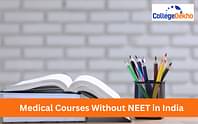- GATE 2025 Syllabus
- GATE 2025 Syllabus Overview
- GATE 2025 Syllabus Official Website
- Will There Be Any Changes in GATE 2025 Syllabus?
- GATE Syllabus 2025 Subject List
- GATE 2025 Syllabus CSE
- GATE 2025 Syllabus ECE
- GATE Syllabus 2025 Mechanical Engineering
- GATE Syllabus 2025 Civil Engineering
- GATE Syllabus 2025 Electrical Engineering
- GATE 2025 General Aptitude Syllabus
- GATE 2025 Engineering Mathematics Syllabus
- Subject-Wise GATE 2025 Syllabus PDF
- Faqs

GATE 2025 Syllabus:
IIT Roorkee has released the GATE 2025 syllabus for all the exams on the official GATE 2025 website, gate2025.iitr.ac.in. The GATE 2025 exam will be held on the 1st, 2nd, 15th, and 16 February 2025. Therefore, you should carefully go through the GATE syllabus 2025 to make revisions and ensure no important topic is left unprepared before going for the examination. You can download the
GATE 2025 syllabus PDF
and mark all the important topics in it, you can further take the help of the syllabus of GATE 2025 to make your preparation and revision strategies for the
GATE 2025 exam
. In this article, we have provided you with download links for all the GATE 2025 subjects and their syllabus. We have also provided a detailed GATE 2025 syllabus CSE and GATE 2025 syllabus ECE below.
Also Check -
GATE 2025 Exam Dates: Application Form, Admit Card, Result Date
Quick Links:
| GATE Exam Pattern 2025 | GATE Preparation Tips 2025 |
|---|---|
| GATE Best Books 2025 | GATE Previous Year Question Papers |
| GATE Sample Papers 2025 | GATE Mock Test 2025 |
| Best Coaching Institutes for GATE 2025 | - |
GATE 2025 Syllabus
IIT Roorkee, the conducting authority for the GATE 2025 exam has published the GATE syllabus 2025 PDF on its official website gate2025.iitr.ac.in. The syllabus of GATE 2025 is different for different branches. However, the General Aptitude section under the GATE 2025 syllabus is the same across all papers. You should know that the GATE 2025 question paper will be prepared based on the GATE syllabus 2025 topics only. A total of 65 questions worth 100 marks will be asked from General Aptitude, Engineering Mathematics, and Core Subjects.GATE 2025 Syllabus Overview
The syllabus of GATE 2025 has been released in PDF format to allow you to download the same for future reference. It includes all the topics and sub-topics from the GATE 2025 syllabus CSE, the GATE 2025 syllabus ECE, and so on. You can get an overview of the GATE syllabus 2025 from the table below.| Particulars | Details |
|---|---|
| Name of the Exam | GATE 2025 |
| GATE Full Form | Graduate Aptitude Test for Engineering |
| Conducting Body | IIT Roorkee |
| GATE 2025 Exam Date | February 1, 2, 15 & 16, 2025 (Announced) |
| GATE 2025 Syllabus PDF Release Date | July 1, 2024 (Released) |
| GATE Syllabus 2025 PDF Release Mode | Online |
| Total Number of Sections in GATE Syllabus except for papers AR, CY, DA, EY, GG, MA, PH, ST, XH, and XL |
3 Sections –
|
| Total Number of Sections in GATE Syllabus for papers AR, CY, DA, EY, GG, MA, PH, ST, XH, and XL |
2 Sections
|
| Total Number of Papers | 30 |
| GATE 2025 Syllabus Official Website | gate2025.iitr.ac.in |
GATE 2025 Syllabus Official Website
The GATE syllabus 2025 official website link is www.gate2025.iitr.ac.in, which is the portal of IIT Roorkee. The GATE 2025 syllabus has been released here along with the exam pattern. You are advised to visit the IIT Roorkee website to stay updated on the upcoming GATE examination.| www.gate2025.iitr.ac.in |
|---|
Will There Be Any Changes in GATE 2025 Syllabus?
The syllabus of the GATE exam remains the same for the year 2025. The conducting authority, IIT Roorkee has released the updated GATE 2025 syllabus on its website. You should note that over the last few years, subjects, such as Data Science and Artificial Intelligence (DA) in 2024, Humanities and Social Sciences (XH) and Environmental Science and Engineering (ES) in 2022, and Geomatics Engineering (GE) and Naval Architecture and Marine Engineering (NM) in 2021 were added to the GATE syllabus.GATE Syllabus 2025 Subject List
The GATE 2025 syllabus is published for 30 papers. You can check the complete list of subjects and paper codes of the GATE syllabus 2025 below. The GATE exam authorities provide GATE paper codes to each subject. These paper codes help you identify information about the particular exam. Check the list of GATE 2025 paper codes and subjects here:| Sl. No. | Name of the Subject | Paper Code |
|---|---|---|
| 1 | Aerospace Engineering | AE |
| 2 | Agricultural Engineering | AG |
| 3 | Architecture and Planning | AR |
| 4 | Biotechnology | BT |
| 5 | Biomedical Engineering | BM |
| 6 | Civil Engineering | CE |
| 7 | Chemical Engineering | CH |
| 8 | Computer Science and Information Technology | CS |
| 9 | Chemistry | CY |
| 10 | Data Science and Artificial Intelligence | DA |
| 11 | Electronics and Communication Engineering | EC |
| 12 | Electrical Engineering | EE |
| 13 | Ecology and Evolution | EY |
| 14 | Environmental Science and Engineering | ES |
| 15 | Engineering Sciences | XE |
| 16 | Geomatics Engineering | GE |
| 17 | Geology and Geophysics | GG |
| 18 | Humanities and Social Sciences | XH |
| 19 | Instrumentation Engineering | IN |
| 20 | Life Sciences | XL |
| 21 | Mathematics | MA |
| 22 | Mechanical Engineering | ME |
| 23 | Mining Engineering | MN |
| 24 | Metallurgical Engineering | MT |
| 25 | Naval Architecture and Marine Engineering | NM |
| 26 | Petroleum Engineering | PE |
| 27 | Physics | PH |
| 28 | Production and Industrial Engineering | PI |
| 29 | Statistics | ST |
| 30 | Textile Engineering and Fibre Science | TF |
GATE 2025 Syllabus CSE
The GATE syllabus 2025 CSE includes sections like Engineering Mathematics, General Aptitude, and Core Computer Science Engineering topics, like Digital Logic, Programming, and Data Structures, etc. Here is an overview of the GATE 2025 syllabus CSE:| GATE Syllabus 2025 Topics | Sub-Topics |
|---|---|
| Digital Logic |
|
| Discrete Mathematics |
|
| Programming and Data Structures |
|
| Computer Organization and Architecture |
|
| Theory of Computation |
|
| Algorithms |
|
| Operating System |
|
| Compiler Design |
|
| Computer Networks |
|
| Databases |
|
Quick Links:
| GATE Exam Date 2025 | GATE Eligibility Criteria 2025 |
|---|---|
| GATE Application Form 2025 | GATE Admit Card 2025 |
| GATE Exam Centres 2025 | - |
GATE 2025 Syllabus ECE
The GATE syllabus 2025 ECE is divided into 8 units – Engineering Mathematics, Electronic Devices, Analogue Circuits, Digital Circuits, Communications, Control Systems, Electromagnetics, and Network, Signals and Systems. Here is a look at the sub-topics from each of the units:| GATE Syllabus 2025 Topics | Sub-Topics |
|---|---|
| Electronic Devices |
|
| Control Systems |
|
| Networks, Signals and Systems |
|
| Digital Circuits |
|
| Analog Circuits |
|
| Electromagnetics |
|
| Communications |
|
| Engineering Mathematics |
|
GATE Syllabus 2025 Mechanical Engineering
The GATE 2025 syllabus ME includes topics, such as Engineering Mathematics, General Aptitude, Fluid Mechanics and Thermal Sciences, Applied Mechanics and Design, and Materials, Manufacturing, and Industrial Engineering. You can check the detailed GATE Mechanical Engineering syllabus 2025 below.| GATE 2025 Syllabus Topics | Sub-Topics |
|---|---|
| Mechanics of Materials |
|
| Engineering Mechanics |
|
| Machine Design |
|
| Vibrations |
|
| Theory of Machines |
|
| Fluid Mechanics |
|
| Thermodynamics |
|
| Heat-Transfer |
|
| Applications |
|
| Machining and Machine Tool Operations |
|
| Engineering Materials |
|
| Metrology and Inspection |
|
| Casting, Forming and Joining Processes |
|
| Production Planning and Control |
|
| Computer Integrated Manufacturing |
|
| Operations Research |
|
| Inventory Control |
|
GATE Syllabus 2025 Civil Engineering
The GATE Civil Engineering syllabus 2025 is divided into 6 units, each having several sub-topics. The detailed GATE 2025 syllabus CE has been provided below for reference.| GATE 2025 Syllabus Topics | Sub-Topics |
|---|---|
| Engineering Mechanics |
|
| Structural Analysis |
|
| Solid Mechanics |
|
| Construction Materials and Management |
|
| Steel Structures |
|
| Concrete Structures |
|
| Foundation Engineering |
|
| Soil Mechanics |
|
| Fluid Mechanics |
|
| Hydrology |
|
| Hydraulics |
|
| Irrigation |
|
| Air Pollution |
|
| Water and Waste Water Quality and Treatment |
|
| Municipal Solid Wastes |
|
| Traffic Engineering |
|
| Highway Pavements |
|
| Transportation Infrastructure |
|
| Geomatics Engineering |
|
GATE Syllabus 2025 Electrical Engineering
The GATE 2025 syllabus EE encompasses various topics, such as Engineering Mathematics, General Aptitude, Electrical Machines, Electric Circuits etc. Here is an overview of the GATE Electrical Engineering syllabus 2025:| GATE 2025 Syllabus Topics | Sub-Topics |
|---|---|
| Electromagnetic Fields |
|
| Electric Circuits: Network elements |
|
| Electrical Machines |
|
| Signals and Systems |
|
| Control Systems |
|
| Power Systems |
|
| Analog and Digital Electronics |
|
| Electrical and Electronic Measurements |
|
| Power Electronics |
|
GATE 2025 General Aptitude Syllabus
The General Aptitude is a common subject for all the GATE 2025 subjects. The General Aptitude covers a significant part of the GATE 2025 question paper. The questions from this section have a total of 15 marks. In the following table, we have provided the detailed GATE 2025 General Aptitude syllabus:
Sections | Topics |
|---|---|
Verbal Aptitude | Basic English grammar: tenses, articles, adjectives, prepositions, conjunctions, verb-noun agreement, and other parts of speech Basic vocabulary: words, idioms, and phrases in context, reading and comprehension, Narrative sequencing. |
Quantitative Aptitude | Data interpretation: data graphs (bar graphs, pie charts, and other graphs representing data), 2- and 3-dimensional plots, maps, and tables Numerical computation and estimation: ratios, percentages, powers, exponents and logarithms, permutations and combinations, and series Mensuration and geometry Elementary statistics and probability |
Analytical Aptitude | Logic: deduction and induction, Analogy, Numerical relations and reasoning. |
Spatial Aptitude | Transformation of shapes: translation, rotation, scaling, mirroring, assembling, and grouping paper folding, cutting, and patterns in 2 and 3 dimensions. |
GATE 2025 Engineering Mathematics Syllabus
Engineering Mathematics is a section in most of the GATE 2025 subjects. IIT Roorkee has uploaded the Engineering Mathematics 2025 syllabus to the official website. You can also check the GATE 2025 Engineering Mathematics syllabus from the table below:
Sections | Topics |
|---|---|
Calculus | Functions of two or more variables, continuity, directional derivatives, partial derivatives, total derivative, maxima and minima, saddle point, method of Lagrange’s multipliers; Double and Triple integrals and their applications to area, volume, and surface area; Vector Calculus: gradient, divergence and curl, Line integrals and Surface integrals, Green’s theorem, Stokes’ theorem, and Gauss divergence theorem. |
Linear Algebra | Finite dimensional vector spaces over real or complex fields; Linear transformations and their matrix representations, rank and nullity; systems of linear equations, characteristic polynomial, eigen values and eigen vectors, diagonalization, minimal polynomial, Cayley-Hamilton Theorem, Finite dimensional inner product spaces, Gram-Schmidt orthonormalization process, symmetric, skew-symmetric, Hermitian, skew-Hermitian, normal, orthogonal and unitary matrices; diagonalization by a unitary matrix, Jordan canonical form; bilinear and quadratic forms. |
Real Analysis | Metric spaces, connectedness, compactness, completeness; Sequences and series of functions, uniform convergence, Ascoli-Arzela theorem; Weierstrass approximation theorem; contraction mapping principle, Power series; Differentiation of functions of several variables, Inverse and Implicit function theorems; Lebesgue measure on the real line, measurable functions; Lebesgue integral, Fatou’s lemma, monotone convergence theorem, dominated convergence theorem. |
Complex Analysis | Complex number and polar form, Analytic functions, Taylor and Laurent series, Cauchy-Riemann equations, Residue theorem, Cauchy’s integral theorem and integral formula |
Ordinary Differential Equations | First-order equations (linear and nonlinear),| Higher-order linear differential equations, Partial differential equations, Initial and boundary value problems, Method of separation of variables, Euler Cauchy's equation, Laplace transforms, Solutions of heat, wave and Laplace's equations |
Algebra | Matrices and determinants, Caley Hamilton theorem, Eigenvalues and eigenvectors, Linear and orthogonal transformations, Solutions of linear equations, Matrix algebra, LU decomposition |
Functional Analysis | Normed linear spaces, Banach spaces, Hahn-Banach theorem, open mapping and closed graph theorems, the principle of uniform boundedness; Inner-product spaces, Hilbert spaces, orthonormal bases, projection theorem, Riesz representation theorem, spectral theorem for compact self-adjoint operators. |
Numerical Methods | Matrix inversion, Integration by trapezoidal and Simpson's rules, Numerical solutions of linear and non-linear algebraic equations, Single and multi-step methods for differential equations, Newton-Raphson method, Explicit Euler's method |
Partial Differential Equations | Classification of second-order linear partial differential equations, Method of separation of variables, One-dimensional heat equation, Two dimensional Laplace equation |
Topology | Basic concepts of topology, bases, subbases, subspace topology, order topology, product topology, quotient topology, metric topology, connectedness, compactness, countability and separation axioms, Urysohn’s Lemma. |
Linear Programming | Linear programming models, Basic feasible solution, graphical method, simplex method, two-phase methods, revised simplex method; Infeasible and unbounded linear programming models; Duality theory; Balanced and unbalanced transportation problems Optimal solution, Solving assignment problems, Hungarian method. |
Subject-Wise GATE 2025 Syllabus PDF
IIT Roorkee has released the subject-wise GATE syllabus 2025 PDF along with the paper pattern. The syllabus of GATE 2025 is the same as last year’s. Candidates can download the GATE 2025 syllabus PDF from the links below.Related Articles
We hope this article proves helpful to all aspirants looking for the GATE 2025 syllabus. For more updates, stay tuned to CollegeDekho!Are you feeling lost and unsure about what career path to take after completing 12th standard?
Say goodbye to confusion and hello to a bright future!

FAQs
The GATE Mechanical Engineering syllabus 2025 is usually considered moderate to tough in terms of difficulty level due to the extensive nature of the course curriculum. Generally, Numerical Answer Type questions are asked from topics, such as Applied Mechanics, Fluid Mechanics and Thermal Sciences, Manufacturing and Industrial Engineering etc.
The official website to check GATE syllabus 2025 is gate2025.iitr.ac.in. The complete GATE 2025 syllabus has been published by IIT Roorkee.
You can check the GATE 2025 syllabus from the official website of IIT Roorkee - gate2025.itr.ac.in. The detailed syllabus of GATE 2025 has also been provided in the above article.
Completing GATE syllabus in 2 months can be extremely challenging considering the vastness of the syllabus and difficulty level of the entrance examination. It takes at least 6-7 months of preparation to crack GATE with a good rank. Therefore, it is important to plan your studies in a way that you are not only able to cover the GATE 2025 syllabus but left with sufficent time for revisions and mock tests. Make sure you pay attention to those topics that are easy to comprehend and carry the maximum weightage.
No, GATE syllabus for the year 2025 has not been changed. The paper-wise detailed GATE 2025 syllabus is available at the website - gate2025.iitr.ac.in.
The Indian Institute of Technology (IIT), Roorkee, which is the administering body for GATE 2025 session is the one releasing the detailed syllabus for all papers/ subjects on its official website.
The GATE CS syllabus 2025 is quite detailed, providing students with in-depth knowledge about Computer Network, Programming etc. The core topics included in the GATE syllabus 2025 for CSE are Digital Logic, Theory of Computation, Databases, Discrete Mathematics, Algorithms, Operating Systems, Compiler Design, and Computer Organization and Architecture.
The GATE PI syllabus 2025 covers topics from Manufacturing Processes, Quality and Reliability, General Engineering, Operations Research and Operations Management, Engineering Mathematics etc. Some of the key topics that students must study GATE Production and Industrial Engineering 2025 syllabus are Total Quality Management, Six Sigma Principles, Statistical Quality Control and so on.
Yes, IIT Roorkee has published the GATE 2025 syllabus on its website - gate2025.iitr.ac.in. The syllabus of GATE 2025 includes all the important topics and subjects based on which the question paper will be prepared.
GATE Previous Year Question Paper
Was this article helpful?



















Similar Articles
BMS College of Engineering KCET Cutoff Trends
BHEL Cutoff through GATE 2025: Check Expected and Previous Year Cutoff Trends
RV College of Engineering KCET Cutoff 2025: Check Opening & Closing Ranks
HPCL Cutoff through GATE 2025: Check Expected and Previous year Cutoff Trends
KCET BTech Mechanical Engineering Cutoff 2025: Check Closing Ranks Here
KCET B.Tech CSE Cutoff 2025: Check Closing Ranks Here